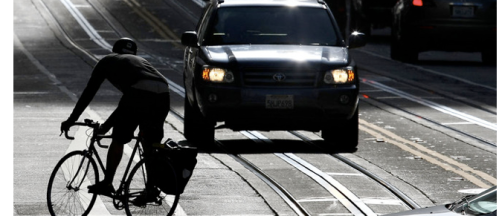This piece was written by Esteban and originally posted on his blog vélo-flâneur.
———–
In a story on All Things Considered, NPR reporter Mandalit del Barco uses the road rage conviction of Dr. Christopher Thomas Thompson to discuss the perceived growing tensions between cyclists and drivers in Southern California, and by implication, how the “problem” unfolds nationally.
(I listened to the first edition on the East Coast feed on WFCR, Amherst MA - ed.) The transcript can be found here.
The story begins with some numbers regarding cyclist fatalities and injuries:
According to the National Highway Traffic Safety Administration, traffic crashes killed 716 cyclists last year and injured 52,000 people riding bikes, trikes and unicycles. That includes recent fatalities from Brookline, Mass., to Portland, Ore. But unlike the Los Angeles case, Mooney says drivers who kill or injure cyclists are rarely convicted.
The problem of driver convictions is made plain. Importantly, the story does not mention that there were 39,800 total motor vehicle-related deaths in 2008 (a record low!). Certainly, cars and trucks represent a threat to cyclists. But the numbers make clear the fact that motor vehicles are deadly for tens of thousands of people every year – a vast majority traveling in cars and trucks.
Yet, del Barco uses the Thompson case from early this year to dig into the issue of motorists’ growing resentment toward cyclists:
The Mandeville Canyon driver’s reaction was perhaps an extreme example of the everyday resentment heard from other motorists.
“These bicyclists are extremely rude, and they take up the road — four, five people at a time,” complained one caller to NPR member station KPCC’s show AirTalk. The caller said he lives in Mandeville Canyon, and he has had it with cyclists.
“When you pull up alongside them and ask them to stay out of your way, they yell at you,” he said. “They’re extremely provocative, they’re asking for trouble, and this is not the worst case that’s going to happen. Someone’s going to get killed, and to be frank with you, the residents aren’t going to feel too bad about it.”
This story constructs the problem as cyclist behavior, not the aggressive driving, honking, and impatience. This frame is strengthened by two subsequent passages: the first tells of reasonable but lawless behavior:
“When I see the light turn red, I try to race as fast as I can through it,” she says, “because I know I will have a block of peace and quiet, where there won’t be cars behind me.”
And the second provides an example of cyclists complaining bout law-breaking cyclists:
But even Thompson and another bike blogger, Ted Rogers, disapprove of reckless bike riders who maneuver through traffic as if playing a video game.
“Oh, we hate these guys,” says Rogers. “We absolutely hate them. The driver you tick off is the one who’s going to run me off the road.”
These instances are not out of the ordinary. For responsible and safe cyclists, sometimes running a red light is safer (like waiting to make a left turn) than standing in the middle of an active intersection like a sitting duck. And much of the “problem” of cyclist behavior comes from irresponsible riders who flaunt both safety and the law.
This story has some real positives for cyclist safety – it gives advocates a voice and lays out the danger that motorists facilitate. But the overall tone of the story is that the problem lies in cycling, if not specific cyclists. We have a right to be on the road, and we should be treated as normal. Most motorists are patient and friendly in my own experience. But also in my own experience, far too many drivers are aggressive, rude, and outright dangerous. Why aren’t motorists and motor vehicles treated as a variable here? In this story, it is the cyclist who causes things, not the drivers. del Barco, in effect, further normalizes “motorism” and implicitly marginalizes cycling as a normal, appropriate, and legal method of travel.



Moments before Esteban granted us permission to re-post his excellent piece on Bic Control, we posted a giant comment response on Bike San Diego, who also re-posted Esteban's piece.
ReplyDeleteOur comment supports Esteban's claim that--we're paraphrasing here--there is a growing trend of biased auto-centric media representations of bike ridership focused on the supposed "conflict" that cyclists create rather than focusing on the sociological root cause. Our comment also discusses the 'stay-out-my-way!'-motorists who dominate our city streets and subscribe to the Culture of Immediacy school-of-thought which places their immediate priorities (i.e. getting somewhere as fast as possible) far above the well-being and livelihood of other innocent human beings---an inherently selfish activity. Not only is this reasoning selfish, it is also completely unsustainable and backwards in this global warming era, which needs more cyclists not less.
We also argue that 'stay-out-my-way!-motorists, like the motorist who called NPR, are more bothered by vehicular cyclists who take the lane rather than cyclists who roll stop signs.
But that doesn't mean we're going to stop riding vehicularly. The great sociologist Alexis de Tocqueville has got our back on that one.
Read the comment here:
http://www.bikesd.org/2009/12/npr-story-on-aggressive-drivers-normalizes-motorists/
I found a SD planning survey for cyclists you and your readers might be interested in.
ReplyDeletehttp://www.surveymonkey.com/s.aspx?sm=HwtIfqNHHL939XC2ZosA3w_3d_3d
"We also argue that 'stay-out-my-way!-motorists, like the motorist who called NPR, are more bothered by vehicular cyclists who take the lane rather than cyclists who roll stop signs. "
ReplyDeleteThis is completely right-on!
Thanks for the link, Tin.
ReplyDeleteThanks for letting us re-post your piece, Velo Flaneur. We're glad you dug our comment response here and on Bike SD. It really means alot. We're glad SD's got you in it.